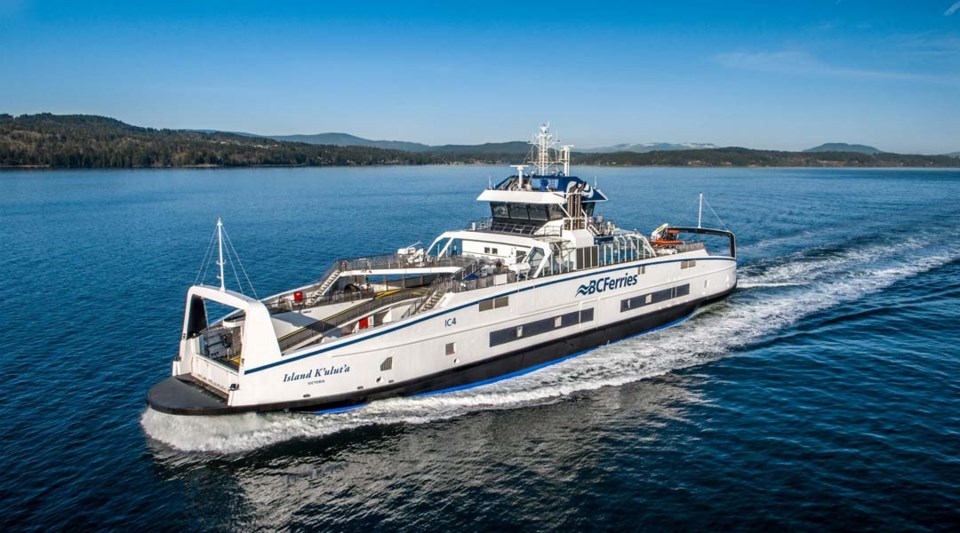“When anxious, uneasy and bad thoughts come, I go to the sea, and the sea drowns them out with its great wide sounds, cleanses me with its noise, and imposes a rhythm upon everything in me that is bewildered and confused.”
— Rainer Maria Rilke
“I bet you never smelled a real school bus before.”
— Ferris Bueller’s Day Off
The last –°¿∂ ”∆µ Ferries run from Port McNeill was late last night, which is good.
The crew of the Island K’ulut’a delayed departure for an hour, until 10:30 p.m., so that students from Alert Bay and Sointula could go to their high school grad festivities.
That’s the thing about the vessels that serve the little communities floating off Vancouver Island. The ferries might seem romantic or exotic to starry-eyed tourists gawking at the postcard-pretty scenery sliding by, but to a lot of kids they’re just the school bus. In this case, a school bus staffed by neighbours who recognize that grad night is important.
Deckhand James Glendale knows. He has spent 32 years on the route, ferrying students to North Island Secondary School, the same institution he graduated from in 1989. “You get to see them when they first come on as Grade 8s — they look scared as heck, not knowing what they’re getting into. And each year, they seem to mature a bit more.”
The kids, crew and adult commuters become familiar to one another. “We all know them, say hi in the morning,” says Sointula’s Brooklynn Watson, one of 18 NISS students who take the ferry from Malcolm Island each day. The Island K’ulut’a’s schedule means the 70 or so students from Alert Bay, on Cormorant Island, usually make the 45-minute crossing to Port McNeill via foot ferry instead.
They’re far from the only high schoolers to commute over water. Gabriola kids ferry to Nanaimo, Quadra Islanders to Campbell River, and a handful trickle off the Denman Island boat en route to Courtenay. Water taxis shuttle students from the outer Gulf Islands to high school on Salt Spring. (The pilot of one boat once told me he was amazed by the ability of teenage girls to apply makeup in the pitch black and a three-foot swell.)
Sometimes the commute is too much, forcing families to make tough decisions. Teens from outposts such as Surge Narrows or Cortes Island or Lasqueti often board out for high school. Or sometimes their families just pull up stakes.
Keeping communities livable for families is a big deal on the coast. Without an elementary school, and without relatively easy access to high school, good luck attracting anyone other than retirees. That’s why gestures like –°¿∂ ”∆µ Ferries’ traditional grad-night delay for those travelling from Port McNeill are important.
Ferrying to school is still a challenge, though, as this year’s dozen NISS grads from Sointula and Alert Bay can attest.
Take Watson. For the past five years the 17-year-old has been up at 6 a.m., out the door for the Malcolm Island school bus at 7:30, onto the ferry for a 7:55 departure, and in Port McNeill half an hour later for classes that begin at 8:46.
At least the spiffy new Island class ferry is more reliable than the one it replaced, she says. If late, it has the ability to speed up and get back on schedule. The older, smaller ferry didn’t. “When it got behind, it was behind all day.”
Still, living to the rhythm of an every-three-hours ferry can be awkward. Going to soccer practice, or work, or whatever means either arriving in Port McNeill way early or showing up late. Afterward, you have to hang around waiting for the next boat to take you home. “It’s not that it prevents us from doing things. It just makes for a really long day,” Watson says.
Fellow grad Giselle Alfred, 18, of Alert Bay says the same thing. “In the winter, you’re leaving in the dark and getting home in the dark.” It was particularly hard when pandemic rules required students to stay isolated within cohorts, which meant the foot ferry had to take two trips, which meant she had to set her alarm for 5:30 a.m. and arrive in Port McNeill 1 ½ hours before classes began.
Winter can also mean rough weather, which Alfred says she actually enjoys, though sometimes winds get so high that the ferries can’t operate. With an eye on the marine forecast, kids often stay home rather than risk being trapped on the other side, though that still happens.
“All of us are all too familiar with being stuck over in Port McNeill,” Watson says. She recalls dining on Mr. Noodles after the school opened its vending machines. NISS keeps sleeping bags and sleeping mats for emergencies.
The thing is, both Watson and Alfred love where they live, in closely knit, supportive communities. The ferry hasn’t stopped Watson from living a busy life, volunteering at the pharmacy and veterinary hospital in Port McNeill and as a junior firefighter and at the school in Sointula, a place she makes sound like Paradise. “It’s definitely worth it,” she says of the daily commute.
Alfred talks about the life lessons of the ferry — it teaches you time management, and to be organized, because there’s no going back for whatever you forgot at home.
And then there’s the trip itself. Seeing rafting otters ride the waves, or having whales surface so close that you can hear them exhale never gets old. “It’s still a magical experience,” Alfred says.
She’ll be off to McGill University in Montreal in the fall, while Watson will head for the University of –°¿∂ ”∆µ in Vancouver, giving them a taste of city life. Neither of them makes the prospect sound more attractive than living in a place where your neighbours look out for you, delaying the ferry so that you can go to grad.



